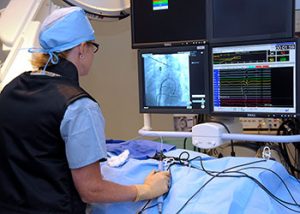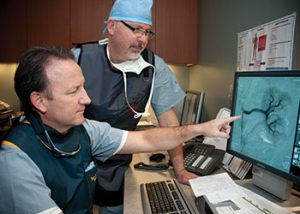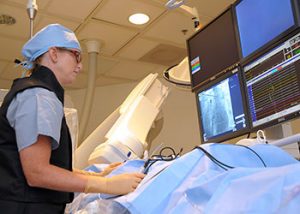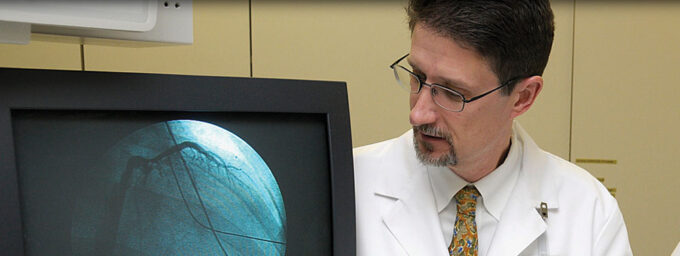Michigan Heart Rhythm Group: State-of-the-Art Management of Heart Rhythm Disorders
Michigan Heart Rhythm Group offers highly progressive, highly personalized medical and interventional strategies to address, manage and/or resolve your heart rhythm disorder. To learn about the services that the Rhythm Group provides including pacemaker/defibrillator insertion and management, ablation procedures and a full range of services for atrial fibrillation explore the links below.
Pacemaker Insertion The normal, healthy heart has its own pacemaker that regulates the rate that the heart beats. However, some hearts don’t beat regularly. Often a pacemaker can correct the problem. A pacemaker is a small device that sends electrical impulses to the heart muscle to maintain a suitable heart rate and rhythm.
The normal, healthy heart has its own pacemaker that regulates the rate that the heart beats. However, some hearts don’t beat regularly. Often a pacemaker can correct the problem. A pacemaker is a small device that sends electrical impulses to the heart muscle to maintain a suitable heart rate and rhythm.
Pacemakers are implanted just under the skin of the chest during a minor surgical procedure. The pacemaker has two parts: the leads and a pulse generator. The pulse generator houses the battery and a tiny computer, and resides just under the skin of the chest. The leads are wires that are threaded through the veins into the heart and implanted into the heart muscle. They send impulses from the pulse generator to the heart muscle, as well as sense the heart’s electrical activity. Each impulse causes the heart to contract.
The pacemaker may have one to three leads, depending on the type of pacemaker needed to treat your heart problem. Michigan Heart Rhythm Group physicians have extensive experience implanting pacemakers with several thousand devices over the past 20 years. Our physicians are board certified in electrophysiology and heart rhythm management.
 An implantable cardioverter-defibrillator (ICD) is a small device that uses electrical pulses or shocks to help control abnormal heart rhythms, especially ones that can be life-threatening. An ICD continuously checks the heart’s rhythm. If the ICD detects a life-threatening rapid heart rhythm, it sends an electric shock to the heart to restore a normal rhythm. The device then goes back to its watchful mode. An ICD is implanted under the skin in the chest. Wires threaded through a large vein connect the device to the heart.
An implantable cardioverter-defibrillator (ICD) is a small device that uses electrical pulses or shocks to help control abnormal heart rhythms, especially ones that can be life-threatening. An ICD continuously checks the heart’s rhythm. If the ICD detects a life-threatening rapid heart rhythm, it sends an electric shock to the heart to restore a normal rhythm. The device then goes back to its watchful mode. An ICD is implanted under the skin in the chest. Wires threaded through a large vein connect the device to the heart.
A biventricular ICD (BiV ICD) is a special kind of implanted defibrillator that has an extra or left ventricular lead that is inserted. This special device sends small electrical impulses through the leads which allow the right and left ventricles to pump together. This therapy has been shown to improve the symptoms of heart failure and overall quality of life in certain patients with severe symptoms that are not controlled with medication.
Michigan Heart Rhythm Group has board-certified electrophysiologists that have been performing this procedure for many years.
 Ablation is a procedure used to selectively destroy areas of the heart that are causing a heart rhythm problem. During this procedure, thin, flexible wires are inserted into a blood vessel and threaded up through the blood vessel and into the heart under X-ray guidance. The wires allow the doctor to record the electrical activity of your heart and determine what kind of heart rhythm problem you have. Your Michigan Heart Rhythm Group board-certified electrophysiologist will find the areas in the heart that are causing the rhythm problem. Thin wires are then used to send energy to those areas in the heart. This energy is in the form of heat or freezing cold. The heat or cold destroys, or ablates, the heart tissue. Destroying this tissue can cure your heart rhythm problem. Catheter ablation is done at the hospital where the person can be carefully monitored.
Ablation is a procedure used to selectively destroy areas of the heart that are causing a heart rhythm problem. During this procedure, thin, flexible wires are inserted into a blood vessel and threaded up through the blood vessel and into the heart under X-ray guidance. The wires allow the doctor to record the electrical activity of your heart and determine what kind of heart rhythm problem you have. Your Michigan Heart Rhythm Group board-certified electrophysiologist will find the areas in the heart that are causing the rhythm problem. Thin wires are then used to send energy to those areas in the heart. This energy is in the form of heat or freezing cold. The heat or cold destroys, or ablates, the heart tissue. Destroying this tissue can cure your heart rhythm problem. Catheter ablation is done at the hospital where the person can be carefully monitored.To schedule your appointment, call 248-267-5050 or request your appointment online.

